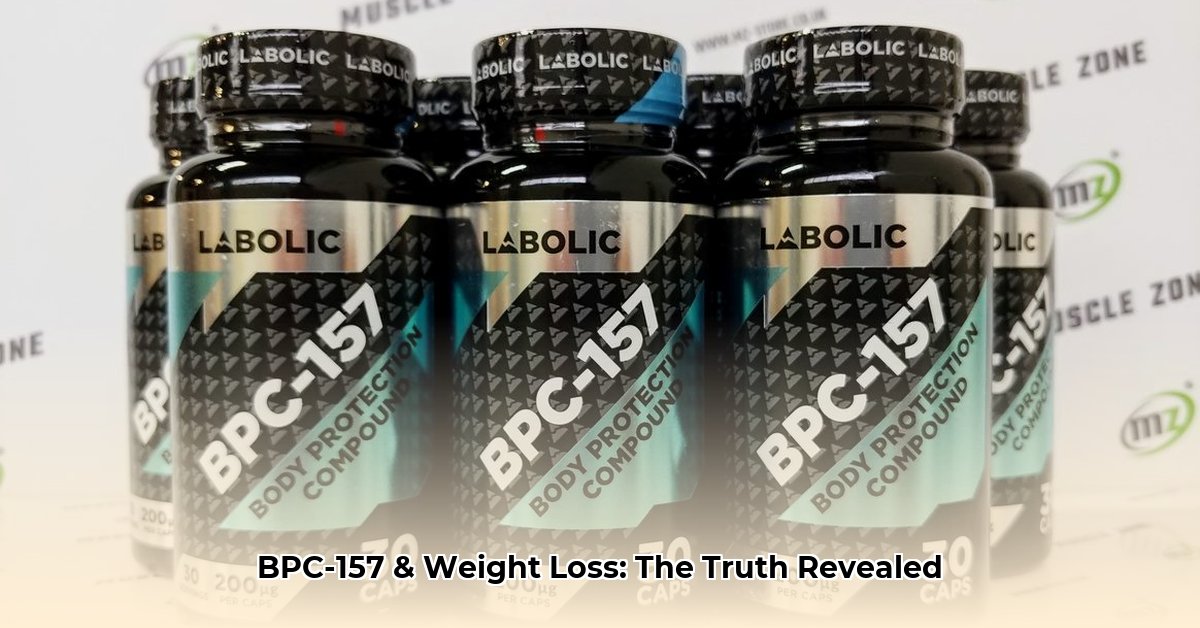
Does BPC-157 Aid in Weight Loss? A Critical Examination
Losing weight effectively often involves exploring various options. BPC-157, a pentadecapeptide (a short chain of amino acids), has garnered attention for its potential applications, including weight loss. However, the current evidence regarding its efficacy for this purpose remains limited and inconclusive. This review critically evaluates the available scientific literature to determine whether BPC-157 can be considered a viable strategy for weight management.
Indirect Mechanisms: Potential Pathways to Weight Influence
While direct evidence supporting BPC-157's role in weight loss is scarce, some indirect mechanisms may be at play. Preclinical studies in animal models suggest potential effects on metabolism and body composition. These studies hint at:
- Improved Metabolism: BPC-157 might influence metabolic pathways, potentially affecting energy expenditure and fat storage. However, the specific mechanisms require further investigation.
- Enhanced Lipolysis: Some studies show enhanced lipolysis (fat breakdown), however, the translation of these findings to humans needs to be explored through rigorous clinical trials. This effect has not been consistently demonstrated.
- Improved Gut Health: BPC-157 exhibits gastroprotective properties. A healthy gut microbiome is linked to metabolic health, suggesting a potential indirect impact on weight management. However, this link remains speculative.
It's crucial to emphasize that these observations are largely based on preclinical research, making generalizations to human physiology premature.
The Critical Gap: Lack of Human Clinical Trials
The most significant limitation in assessing BPC-157's impact on weight loss is the paucity of robust, well-designed clinical trials in humans. Existing data primarily comprises:
- Animal Studies: While promising preclinical results exist, the extrapolation of these findings to the human context is limited by inherent interspecies differences in physiology and metabolism.
- Anecdotal Evidence: Numerous online reports claim successful weight loss with BPC-157, but these accounts lack the rigor and control of scientific studies and are therefore unreliable.
Without large-scale, randomized controlled trials in humans, any claims regarding BPC-157's efficacy for weight loss remain unsubstantiated.
What the Research Doesn't Tell Us (Yet)
Many sources promote BPC-157 as a weight-loss aid, often exaggerating the available evidence. A balanced assessment must acknowledge that:
- Lack of Mechanism Clarification: The exact pathways through which BPC-157 might influence weight remain poorly understood.
- Inconclusive Findings: There is no consensus in animal research; outcomes vary across studies, depending on factors like dosages, administration methods, and animal models.
- Absence of Human Data: The most critical gap remains the absence of large, well-designed human clinical trials providing conclusive evidence of weight loss.
Consequently, the assertion that BPC-157 promotes weight loss remains speculative and cannot be definitively supported by existing scientific data.
Recommendations and Future Directions
Based on the current evidence, several recommendations emerge:
Caution for Consumers: Individuals considering BPC-157 should consult their healthcare providers before use. Current evidence strongly suggests it is not an effective weight loss solution. The potential risks and benefits must be carefully weighed.
The Need for Rigorous Research: Large-scale, double-blind, placebo-controlled clinical trials in humans are essential to ascertain BPC-157's effects on weight and body composition. These studies should investigate diverse populations and examine potential interactions with other factors influencing metabolism.
Regulatory Oversight: Regulatory agencies should monitor the marketing and sale of BPC-157 products, ensuring claims are accurately reflected by scientific evidence. Misleading marketing should be addressed proactively.
Responsible Marketing: Companies marketing BPC-157 products must refrain from making unsubstantiated claims of weight-loss benefits. Transparency in research and evidence-based marketing practices are imperative.
Risk Assessment
Using BPC-157 for weight loss carries potential risks, including:
- Adverse Effects: Although generally considered safe, the potential for side effects remains. These could range from mild (e.g., injection site reactions) to more severe, although their likelihood and severity are currently largely unknown.
- Unproven Efficacy: Perhaps the greatest risk is the investment of time and potentially money on a treatment with unproven efficacy for weight loss.
- Drug Interactions: The potential for drug interactions remains unexplored. Consulting a doctor to check for possible interactions is crucial.
A comprehensive risk-benefit analysis is necessary before recommending BPC-157 for weight loss.
Regulatory Landscape and Conclusion
Currently, BPC-157 lacks FDA approval (or equivalent approvals in other jurisdictions) for weight loss. Marketing it as a weight-loss solution is currently premature and potentially subject to regulatory action. The available data is not sufficient to support such claims. Further research is needed to definitively answer the question of whether BPC-157 can contribute to weight loss. Until robust human clinical trials provide conclusive evidence, individuals should rely on proven strategies for weight management, prioritizing a healthy diet, regular exercise, and professional guidance from healthcare professionals.